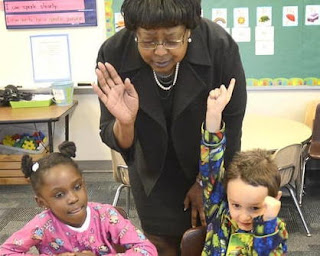Be sure to enter your email address in the Follow Us By Email box in the right-hand column of our blog page to be informed when our blog posts are published.
QUOTE OF THE WEEK
"The future of the United States depends on an educated and empathetic citizenry. It requires us to share a sense of common purpose and recognize our common humanity. It requires an environment that allows every child to thrive and see themselves included in the American story. It requires quality public education. Full stop.
"A historic battle to save this institution and the very idea of good public schools has been underway for some time. It is now intensifying. Attention must be paid." -- Dan Rather and Elliot Kirschner in The Battle To Save Public Education
SAVING PUBLIC EDUCATION
Dan Rather and Elliott Kirschner: The War to Destroy Public Education
NEIFPE was formed in 2012 to help support and defend public education in northeastern Indiana. Our Mission Statement (see the rh column on our full blog page) states our opposition to privatization which has increased over the last couple of decades through the actions of the Indiana General Assembly.
It may sound paranoid, but it's hard to watch what's happening and not think that the goal is the destruction of public education.
From Diane Ravitch
Dan Rather and Elliot Kirschner wrote in their blog Steady about the importance of saving public education from the forces trying to destroy and privatize it. They remind us and the general public that public schools unite us; privatization is inherently divisive. It is ironic that the red states are implementing voucher plans as the evidence about the failure of vouchers and the null effects of charter schools grows stronger...
It is back to school. Students of all ages flock to campuses and classrooms. Fleeting memories of summer are quickly replaced by tests and textbooks.
Getting into the swing of a new semester has always included an adjustment period, but this is a particularly difficult time for many of our nation’s students and their parents, guardians, teachers, and others entrusted with the education of young minds.
...Few institutions in American life are as essential to the continuation of our democracy as the public schools. In a time of ascendent autocracy, attacks on our schools — how they are run, what they teach, what books they have in their libraries — are among the most pernicious, pathetic, and painful assaults on the health of our nation.
Another Day, Another Voucher Study…
One way the Indiana legislature is damaging public education is by diverting public funds meant for public schools into the pockets of private/parochial and charter school operators. We've mentioned before on this page that the state constitution mandates the General Assembly to support only one school system...the public one. Our legislature is funding three school systems with the money meant for one...and it's not helping our students.
In 2011, when then Governor Mitch Daniels pushed his voucher plan through the legislature, the call was to help poor kids "escape" from "failing schools" (defined as schools with low test scores). Now that we know charters and private schools don't do any better job of educating children -- the main problem is poverty -- the talking points have changed to focus on "choice."
Yet the "choice" is with the school, not the parents. Any private school in Indiana can refuse to allow your child to attend if their test scores are too low, if their parents don't conform to their ideal, if you can't afford to provide transportation, if the students themselves don't conform, or any other reason they can drum up to ensure that only the "right kind" of students attend their school. Public schools accept all students.
From Sheila Kennedy
Okay–I know it’s just one more time beating that horse (an animal quite probably dead by now…), but I can’t resist. Brookings has just issued yet another study confirming the educational downsides of voucher programs.
The study was prompted by the recent expansion of voucher programs and “education savings accounts,” (ESAs) which are functionally the same thing–the use of public money to allow parents to send their children to private schools. That expansion has occurred primarily in states that voted for Trump in 2020, which should be a clue that these programs are based on ideology; their proponents simply ignore that pesky inconvenient thing called evidence.
...This study confirms a number of the findings of previous research: for example, that after expansion of a voucher program or implementation of an ESA, pop-up schools immediately appear, many of which will close rather quickly, and that existing private schools raise their tuition.
The study notes that a decade of research has confirmed that vouchers reduce student academic achievement. Brookings cites studies from Louisiana and Indiana, among others, that found quite substantial declines in student test scores. (Indiana’s pathetic legislature simply ignored the fact that Indiana’s voucher program had demonstrably failed to perform as promised. In its recent session, the legislature made the program available to virtually all of Indiana’s schoolchildren, and is now promoting it heavily.)
SCHOOL LIBRARIES ARE DISAPPEARING
Where Have School Libraries Gone?
Steven Singer makes the case for saving school libraries.
From Gadfly on the Wall Blog
The School Library Journal and the National Center for Education Statistics (NCES) reported:
“Between the 1999–2000 and 2015–16 school years, the NCES reports that the profession lost the equivalent of more than 10,000 full-time school librarian positions nationwide. That translates to a 19 percent drop in the workforce, from 53,659 to 43,367. The most rapid declines happened from 2009–10 to 2013–14. The decline slowed from then to 2014–15; but resumed larger losses in 2015–16, the latest data available.”We see school libraries being closed in Philadelphia, Boston, Los Angeles, Washington, DC, etc. A 2016 report in The Guardian indicates how serious the problem is worldwide:
“Libraries should be a right in schools. We must give pupils the opportunity to go to a quiet place to do extra study or to choose a book to read. It is particularly important to children from deprived areas. Opening a library door helps children open their mind. For many, books are too expensive and a library allows students to borrow them.”The problems is often one of priorities. Districts would rather spend billions on technology than libraries. However, both are important. Schools should not have to choose. They should make more diligent decisions about which technologies are most essential instead of buying every new techno-fad with huge promises and no track record.
PRAISE FOR WENDY ROBINSON
Robinson's professionalism drew the praise of her peers – and her parent
Karen Francisco who now lives in Littleton, Colorado, retired as editorial page editor of The Fort Wayne Journal Gazette in 2021. In this op-ed she remembers former Fort Wayne Community Schools superintendent, Wendy Robinson who died last week. (The full article is available to subscribers of the Journal Gazette.)
By Karen Francisco in the Fort Wayne Journal Gazette**
One of the first challenges Wendy Robinson faced when she was appointed superintendent of Fort Wayne Community Schools came from a school board member who didn’t like the way the district taught reading.
At-large member Kurt Walborn’s criticism of the reading curriculum was well intentioned, of course. His young son, diagnosed with dyslexia, had struggled to read until Walborn sought out a new approach. The frustrated father ran for school board and became a passionate advocate for the one-on-one tutoring technique he wanted implemented at FWCS.
Today, as school boards across the nation are disrupted by right-wing members intent on banning books, challenging public health mandates and unearthing anything that smacks of social-emotional learning, a board member targeting reading instruction seems almost quaint. But it was in writing the story about the standoff between the new superintendent and Walborn that I developed a true appreciation for Robinson’s commitment to students.
While sympathetic to Walborn’s concerns, she insisted that the district would not drop the investment and promise of its comprehensive literacy program for a single, focused reading instruction method.
“Just as he thinks Reading Recovery doesn’t work for all kids, I feel his program won’t work for all students,” she said at the time. “I’m not out to prove I’m right and he’s wrong. Every year, we are going to do our research. We can’t stay stuck in the same methods if they don’t work.”
THE SCIENCE OF READING OMITS SOME SCIENCE
The science that’s missing from science of reading laws
Background knowledge is crucial to comprehension. Without comprehension, children aren’t really reading no matter how well they can use phonics to sound out words.
From Chalkbeat*
In the long-running reading wars, proponents of phonics have won.*Note: Financial sponsors of Chalkbeat include pro-privatization foundations and individuals such as Bloomberg Philanthropies, Gates Family Foundation, The Walton Family Foundation, and others.
States across the country, both liberal and conservative, are passing laws designed to change the way students are taught to read in a way that is more aligned with the science of reading.
...But there has been much less attention paid to another critical component of reading: background knowledge. A significant body of research suggests students are better able to comprehend what they read when they start with some understanding of the topic they’re reading about. This has led some academics, educators, and journalists to call for intentional efforts to build young children’s knowledge in important areas like science and social studies. Some school districts and teachers have begun integrating this into reading instruction.
**Note: The Fort Wayne Journal Gazette is behind a paywall. Digital access, home delivery, or both are available with a subscription. Staying informed is essential; one way to do that is to support your local newspaper. For subscription information, go to fortwayne.com/subscriptions/ [NOTE: NEIFPE has no financial ties to the Fort Wayne Journal Gazette]
†Note: NEIFPE's In Case You Missed It is posted by the end of the day every Monday except after holiday weekends or as otherwise noted. The next posting of In Case You Missed It will be on September 11, 2023. Thank you for your support of public education.
###
















